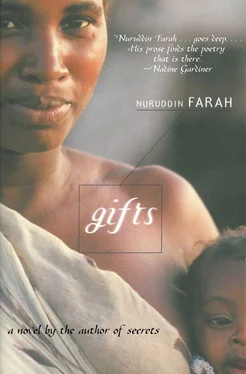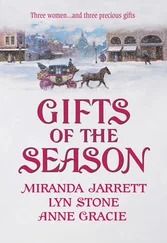Nuruddin Farah - Gifts
Здесь есть возможность читать онлайн «Nuruddin Farah - Gifts» весь текст электронной книги совершенно бесплатно (целиком полную версию без сокращений). В некоторых случаях можно слушать аудио, скачать через торрент в формате fb2 и присутствует краткое содержание. Год выпуска: 2011, Издательство: Arcade Publishing, Жанр: Современная проза, на английском языке. Описание произведения, (предисловие) а так же отзывы посетителей доступны на портале библиотеки ЛибКат.
- Название:Gifts
- Автор:
- Издательство:Arcade Publishing
- Жанр:
- Год:2011
- ISBN:нет данных
- Рейтинг книги:3 / 5. Голосов: 1
-
Избранное:Добавить в избранное
- Отзывы:
-
Ваша оценка:
- 60
- 1
- 2
- 3
- 4
- 5
Gifts: краткое содержание, описание и аннотация
Предлагаем к чтению аннотацию, описание, краткое содержание или предисловие (зависит от того, что написал сам автор книги «Gifts»). Если вы не нашли необходимую информацию о книге — напишите в комментариях, мы постараемся отыскать её.
Gifts — читать онлайн бесплатно полную книгу (весь текст) целиком
Ниже представлен текст книги, разбитый по страницам. Система сохранения места последней прочитанной страницы, позволяет с удобством читать онлайн бесплатно книгу «Gifts», без необходимости каждый раз заново искать на чём Вы остановились. Поставьте закладку, и сможете в любой момент перейти на страницу, на которой закончили чтение.
Интервал:
Закладка:
Shiriye shifted in his seat, ill at ease. Bosaaso, like an asthmatic leaving a room a smoker has entered, got up. Duniya motioned to him to sit and he did so obligingly.
“I’ve come intending to bring only goodwill,” said Shiriye, “and to inquire if I may be of any assistance. I have not come to unbury bones whitened by death. Nor do I like being compared to a dog.”
“Tell me specifically what you’ve come to offer,” said Duniya.
“I have arrived to proffer the advice of an elder brother,” he said. “We won’t get into semantic questions about whether the foundling is a bastard or an orphan. My question all along has been: how will you manage to feed yet another mouth?”
“God gives to whom he pleases,” Duniya said.
Bosaaso averted his eyes, letting them dwell on an eagle above.
Shiriye asked, “Does Abshir know what use you’re making of his highly valued monthly gifts in hard currency?”
“What do you think our brother will do if he’s told I’m running a mini-orphanage?” said Duniya harshly. “Do you think he would disapprove and so discontinue his remittances?”
“If I were Abshir, I would discontinue.”
“Abshir is my full-brother,” said Duniya, “my mother’s son.”
“Thank your fortunate stars I am not Abshir,” said Shiriye.
“I do, I do,” said Duniya.
They both remembered their respective mothers’ quarrel in which Duniya, then only a foetus, was hurt as the two women hit each other with pestles. Duniya also recalled accusing Shiriye of writing a letter to Abshir in which he described her as a street-walker. She claimed she had been sent a photocopy of the missive. Added to this was the fact that Duniya had never forgiven her half-brother for his secret acceptance of bride-gifts from Zubair.
Shiriye said, “Without digging up more skeletons decayed with years of hate and distrust, could you answer my question and tell me why you want to keep the foundling?”
“Would it make sense to a man like you, who has never known the meaning of a kind gesture, that we are keeping him out of pure kind-heartedness, motivated by goodwill, an act of mercy such as one might extend towards a blind man crossing a dangerous road?”
“Did I hear you say ‘We’?” Shiriye asked.
She said, “Yes, you did.”
Bosaaso made his first and only contribution to the discussion: “Duniya and I are co-responsibles for the foundling.”
“There’s nothing to worry about, in that case,” Shiriye responded.
“How do you mean?” Duniya challenged him.
Shrugging his shoulders, Shiriye smiled first at Bosaaso, then turned to his half-sister. “I needn’t worry any more, since there is a man involved in helping you raise the foundling, and I trust that you won’t encounter financial or social difficulties.”
Duniya’s explosive rage was sudden. “Are you telling me, Shiriye, that just because a man has registered his name together with mine as co-guardian of the foundling, everything is fine?”
“I’m saying there’s no cause for worry with a man like Bosaaso sharing responsibility. A woman needs a man by her side, for people to take her seriously and for the world’s doors to open so she may enter with her head raised and her person respected.”
Duniya rose to her feet, her voice angry. “I want you to get out of my sight this instant.”
Shiriye made a friendly overture to Bosaaso, who decided to side with Duniya. Then Shiriye appealed to his nephew and niece, “What on earth has got into her?”
She repeated, “I want you to leave this house now, Shiriye.”
“But…!”
“Otherwise I will not be held responsible for what happens.”
Shiriye saw hate in the eyes of all whose reaction he sought. In Bosaaso’s the sun’s rays were mixed with scorn. A trained army man, Shiriye knew when to retreat. He did so quietly.
No one spoke for a long time, not even Nasiiba; nor did the foundling wake or cry in the prolonged silence. However the young maid, finding all this incomprehensible, made a furtive departure, maybe to report to the outside world on what had happened.
Mataan then told the story of how the dik-dik, a small African antelope, took vengeance on the elephants: “One day a dik-dik was minding its own business, passing along a narrow path in a dense forest, when an elephant in a hurry tried to overtake it. After several attempts, the irate elephant hit the dik-dik with his trunk, and it fell into a huge pile of elephant dung. On recovering from the shock, the dik-dik called a gathering of its clan, at which the dik-diks decided to become territorial and to shit always at the same spot in an attempt to make a huge mountain of their dung in which an elephant would get stuck, trunk and all. And it came to pass that one evening a cow-elephant did.”
A quarter of an hour after Mataan told his unappreciated story, everyone heard a primeval scream. Bosaaso saw Duniya raise her head in the attitude of a she-camel scenting the approach of one of her young. A series of welcoming groans came from the twins, followed by an increasing spiral of noise, culminating in a final yell, which brought forth a young girl who hurled herself into Duniya’s open embrace. There was absolute joy in their getting together, animal rejoicing. Bosaaso thought again of a she-camel’s reunion with one of her own after months of suckling a straw-filled dummy calf.
The twins joined in the hug, but Bosaaso did not feel excluded. He was happy to bear witness to so happy an encounter, on the heels of such hate between a half-brother and half-sister.
“Come, come.” Duniya patted her children on their backs. “Let us introduce Hibo-Yarey to Bosaaso.”
Mataan and Nasiiba would not let go at first. And Yarey was saying, “Where is he? Where is he?” No one was any the wiser, even when the twins let go, whom she meant: Bosaaso or the baby.
Duniya restrained Yarey by taking hold of her hand, dragging her towards Bosaaso, to whom she intended to introduce her. But the little girl wanted to be shown the baby, and was repeating her question, “Where is the baby, Duniya?” (Not living with her, Yarey called her mother Duniya, not Mother or Mummy as the twins did.)
Now each twin took one of Yarey’s hands and brought her to the room where the baby lay in a cot, asleep, “Will one of you please bring him out of the cot and give him to me to hold?” she said.
Mataan lifted the Nameless One from the cot and handed him to Yarey, who received him as a fragile item. Her chest seemed about to explode with her excited breathing.
“Sit down if he’s too heavy for you,” Duniya suggested.
The twins sat on either side of her, balancing the baby on the little girl’s lap. The three of them chattered uncontrollably, Nasiiba summarizing the foundling’s history so far.
“How come you’re here without your overnight bag, Yarey?” Duniya asked.
“Because Uncle Qaasim didn’t have petrol in his car, so he couldn’t bring me. Someone else gave me a lift to a place not far from here, and I ran the rest of the way.”
“Who told you about the baby?” Nasiiba asked.
“I was running home, you see, when Marilyn stopped me to tell me about it. I ran faster to get here because I so was excited.” Despite having one deformed tooth and another that was lifeless, dark, dwarfish-looking, Yarey none the less had a sweet smile.
Duniya now took the opportunity to introduce her to Bosaaso, “Yarey, this is Bosaaso.” And to him, “This is Hibo-Yarey.”
“I guessed as much,” said Bosaaso.
Yarey’s smile was as disarming as a gypsy’s charm. “Has the baby been given a name yet?” she asked Nasiiba.
“His name is Abshir, after Mummy’s brother,” Nasiiba lied.
Читать дальшеИнтервал:
Закладка:
Похожие книги на «Gifts»
Представляем Вашему вниманию похожие книги на «Gifts» списком для выбора. Мы отобрали схожую по названию и смыслу литературу в надежде предоставить читателям больше вариантов отыскать новые, интересные, ещё непрочитанные произведения.
Обсуждение, отзывы о книге «Gifts» и просто собственные мнения читателей. Оставьте ваши комментарии, напишите, что Вы думаете о произведении, его смысле или главных героях. Укажите что конкретно понравилось, а что нет, и почему Вы так считаете.











